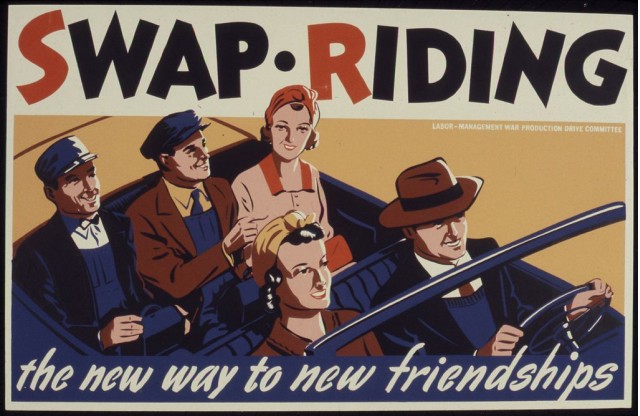 “With a baby and work, everything else is pretty hectic,” said Andrew Pierson, when the Oak Hill, Pawtucket resident was asked why he often drives to work instead of taking RIPTA.
“With a baby and work, everything else is pretty hectic,” said Andrew Pierson, when the Oak Hill, Pawtucket resident was asked why he often drives to work instead of taking RIPTA.
But when Pierson drives to work he never does so solo. He and his wife “carpool approximately three to four days a week.”
Pierson is rare among American drivers, 90 percent of whom make their trips to work alone. Among carpoolers, though, he’s pretty typical. The majority of carpoolers share their vehicles with family.
“Ironically, we have some of our best conversations in the car,” he said. “And when we really need to talk about something and can’t find any time – the car seems to be the best place. Most people thought that having a baby would force us to purchase another car but it really hasn’t been much of a change. We chose a daycare close to one of our offices and she [the baby] is basically part of the carpool.”
One reason families are the center of carpooling is the inherent power inequality between the owner of the vehicle and the non-driving partners. Carpooling is intimate as much because it asks us to share our vulnerability with a stranger as because it shares physical space.
Carpooling to a place with paid parking is different though. I know this because I’ve been in such carpools to Boston at hours when the T doesn’t run. When there’s parking to be paid for, the passenger is king. They have something to bargain with: half the parking fee.
- Seth Yurdin: Parking tax ‘great idea for downtown’
- How to structure a parking tax
- Providence should pass a parking tax
It’s no real revelation, of course, that the cost of things like gas or parking matter to whether or not people choose to share a car. In 1980, when twice as many people (20%) carpooled to work, the price of gasoline was equivalent to $6/gallon. I’m making a different point entirely, which is that in these situations, the power of the lesser partner is amplified. This may be a major key to stretching carpooling beyond families the way it began.
On a commute, a driver of a carpool is providing a real service, but asking for anything can feel crass. The passenger is reaping a real reward, but might feel like a potluck attendee with no food if he or she didn’t offer something to the driver. Because conversations like these force people into acknowledging difference, some people might rather avoid the whole scene.
If the parking tax brings downtown parking from $10 up to $14/day, getting just one passenger should lower that to $7. When a third person is in the car, driving to downtown would be comparable to a round trip bus commute with transfers (just under $5). If carpooling commuters get more passengers than that, they actually beat the cost of transit, with or without transfers. Meanwhile, they save money on car maintenance, gas, taxes for road repair, reduce congestion and pollution, and help put money back into the downtown instead of surface lot owners’ pockets.
- Seth Yurdin: Parking tax ‘great idea for downtown’
- How to structure a parking tax
- Providence should pass a parking tax
Pierson catches a ride with a coworker to meetings about once a week, something he says makes his shared car situation with his wife possible. This has been a real benefit to his family.
“Why waste ten grand on a depreciating asset when [my family and I] can get exercise, enjoy our commute more and spend a few extra minutes together,” he wondered.
Pierson is fairly conscientious about the role of cars in Rhode Island, working recently to encourage Pawtucket to make itself more bike- and pedestrian-friendly. He responded to a tweet asking for carpool interviews. I know Pierson and work with him on some of his goals.
With a higher parking tax, people who never thought about city planning or walkable cities will have it front and center, and they’ll save money because of it too.

